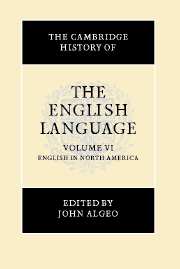Book contents
- Frontmatter
- 1 EXTERNAL HISTORY
- 2 BRITISH AND AMERICAN, CONTINUITY AND DIVERGENCE
- 3 BRITISH AND IRISH ANTECEDENTS
- 4 CONTACT WITH OTHER LANGUAGES
- 5 AMERICANISMS
- 6 SLANG
- 7 DIALECTS
- 8 AFRICAN-AMERICAN ENGLISH
- 9 GRAMMATICAL STRUCTURE
- 10 SPELLING
- 11 USAGE
- 12 CANADIAN ENGLISH
- 13 NEWFOUNDLAND ENGLISH
- 14 American English Abroad
- Glossary of Linguistic Terms
- Bibliography
- Index
- THE CAMBRIDGE HISTORY OF THE ENGLISH LANGUAGE
2 - BRITISH AND AMERICAN, CONTINUITY AND DIVERGENCE
Published online by Cambridge University Press: 28 March 2008
- Frontmatter
- 1 EXTERNAL HISTORY
- 2 BRITISH AND AMERICAN, CONTINUITY AND DIVERGENCE
- 3 BRITISH AND IRISH ANTECEDENTS
- 4 CONTACT WITH OTHER LANGUAGES
- 5 AMERICANISMS
- 6 SLANG
- 7 DIALECTS
- 8 AFRICAN-AMERICAN ENGLISH
- 9 GRAMMATICAL STRUCTURE
- 10 SPELLING
- 11 USAGE
- 12 CANADIAN ENGLISH
- 13 NEWFOUNDLAND ENGLISH
- 14 American English Abroad
- Glossary of Linguistic Terms
- Bibliography
- Index
- THE CAMBRIDGE HISTORY OF THE ENGLISH LANGUAGE
Summary
The continuity of English
British antecedence to American English is reflected first of all by the fact that the language of the United States of America is called “English.” Language is the soul of a nation, as Solzhenitsyn expressed it in his Nobel lecture. Cultures are universally identified with languages, and this has been especially true since the emergence of nation states in the Renaissance. The English language is inextricably associated with England. When the American colonists separated from the mother country, it would have been natural for them to adopt another designation for their language. But the separation of the American nation from England after 1776 was schizophrenic, characterized on the one hand by violent rejection of English tyranny, as it was regarded by the American revolutionaries, and on the other by acute nostalgia for their English culture.
The rejection was mirrored by the provisions in the United States Constitution against aristocracy and autocracy. The anti-English sentiment of the Founding Fathers has been treated by all historians of the American Revolution, but best from our point of view by David Simpson, The Politics of American English, 1776–1850 (1986). At the meetings of the Continental Congress there were half-hearted suggestions that the new nation should adopt another language, such as Hebrew, French, or Greek. But these suggestions were never taken seriously and were capped off by the observation of the Connecticut representative, Roger Sherman, that “it would be more convenient for us to keep the language as it was, and make the English speak Greek” (Baron 13).
- Type
- Chapter
- Information
- The Cambridge History of the English Language , pp. 59 - 85Publisher: Cambridge University PressPrint publication year: 2001
- 8
- Cited by

